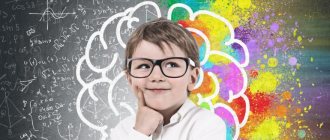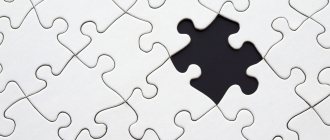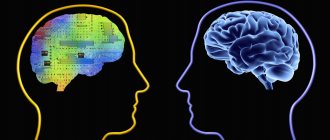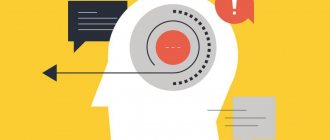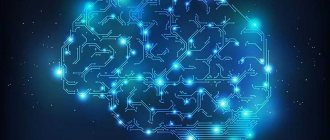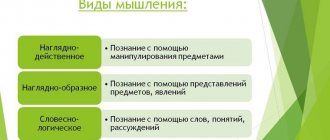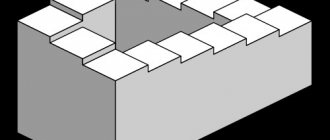Logical thinking is a sequence of reasoning that plays a big role in everyday life. It helps solve business issues, find technical solutions, cope with everyday tasks, and communicate effectively with people.
Logic helps the brain prevent errors that occur despite knowledge and experience. In the article you will find useful tips on how to learn to think logically if you are not convincing enough for your interlocutors and often contradict yourself.
What is logical thinking
The concept is conventionally divided into two components: thinking and logic. The first is the process of obtaining and analyzing information, searching for connections between objects, events, and other parts of reality. For its correct operation, logic is needed, otherwise the detected connections will be erroneous and will not be able to reflect the true state of affairs.
Logic has several definitions, some of which are related to the translation of the word denoting it from Greek. Generally speaking, this is the science of the intellectual mental activity of the brain. Its main task is to find a way out of the situation using the existing premises, and also, through reflection, to better understand the features and nuances of any subject.
The above helps explain what logical thinking is. It is a thought process that requires the application of logical concepts. It requires evidence and prudence. Designed to draw a conclusion based on premises.
Logical thinking has five properties:
- It is formed exclusively experimentally. A person found himself in a certain situation, found a way out of it, faced the consequences and made a series of conclusions. This process is called empirical knowledge.
- It is an acquired, not an innate quality of a person.
- Many people unconsciously avoid developing logic, not wanting to leave their comfort zone.
- Logic sometimes pushes people to inhumane acts, since it is akin to cynical calculation. Together, these two concepts relegate self-sacrifice and philanthropy to last place. A good example is maniacs with a disturbed psyche. Actions that are scary for a normal person are quite logical for them.
- Logic is clearly visible in science. Take, for example, the axioms, deviation from which is usually called a disorder.
Logical thinking is a tool for processing information and forming conclusions. Thanks to him, a person analyzes, evaluates what is happening around him, and also competently presents the information received to his interlocutor.
Types of logical operations
These are mental actions combined with concepts.
- Comparison is a logical operation that compares different objects. In this way, the similarities and differences between them are determined. For example, carrots, beets, and potatoes are vegetables, but they differ in color, but beets and potatoes have a similar round shape. If you think further, you can find even more common features and qualities that speak of difference. Comparison allows you to find out the unique and common features of any object.
- Abstraction highlights the individual property of an object , regardless of other nearby existing objects. Any object has shape, color and properties, but these criteria cannot exist without an object. And yet, the exact sciences make it possible, using abstraction, to study the above-mentioned parameters separately from the object that possesses them.
- A generalization unites and transfers a certain statement to other subjects. For example, if you study the properties of three quadrilaterals at once, you can conclude that this also applies to other quadrilaterals. Another illustration of a generalization: when we enter an apartment from the cold, we feel warm. Our consciousness is immediately visited by the information that in other rooms it should not be colder than in the corridor. The opposite of generalization is specification . This logical operation transfers a general statement to a specific object. For example, all living beings take food. If an unknown creature is discovered, it may also consume food.
- Analysis deals with the decomposition of an object or phenomenon into separate parts. This way, the connection between the parts of an object is clarified, as well as the structure of the object or phenomenon. For example, the composition of an acid can be understood by breaking it down into its elements.
- Synthesis, on the other hand, combines parts of something into a whole (for example, oxygen and hydrogen to make water). And to achieve the truth, human consciousness also needs the ability to combine several thoughts into a single concept.
Components of logical thinking
As stated above, thinking and logic are tools for obtaining and processing information. The process involves creating a certain image that allows you to imagine an object or person located in another place. It comes in several types.
Figurative-logical thinking
In another way it is called visual-figurative. It is a thought process during which a person visually plays out the current situation. Essentially, it is imagination that allows you to recreate vivid, realistic pictures in your brain. The development of this type of logic begins at about one and a half years.
You can check the presence of this ability using the Raven test. The psychologist shows the person sixty tables, each of which contains several pictures without text. They have some kind of connection with each other. At the bottom there are up to 8 figures, one of which is missing. The subject should identify the pattern and find the required detail.
Abstract logical thinking
Allows you to think using abstract images that do not exist in nature. This is an excellent opportunity to simulate relationships both with real people and with non-existent objects invented by the brain.
This type of thinking consists of three elements: understanding, reasoning, and inference.
Verbal and logical thinking
This is a way of thinking using linguistic means, constructions from words. Requires good command of the conversational genre.
Verbal and logical thinking will be needed in many areas of life, for example, when speaking in front of an audience, writing texts, and in disputes. The list can include all situations in which you need to correctly express your thoughts.
How to take classes?
The lessons themselves with all the exercises can be completed in 1-3 weeks, having mastered the theoretical material and practiced a little. But to develop logical thinking, it is important to study systematically, read a lot and constantly train.
For maximum effect, we recommend that you first simply read all the material, spending 1-2 evenings on it. Then take 1 lesson daily, doing the necessary exercises and following the suggested recommendations. After you have mastered all the lessons, engage in effective repetition using this technique to remember the material for a long time. Next, try to apply logical thinking techniques more often in life, when writing articles, letters, when communicating, in disputes, in business, and even in your leisure time. Reinforce your knowledge by reading books and textbooks, as well as using additional material, which will be discussed below.
Applying logic
Logic and thinking are used in almost all areas of life. They will be needed by humanists, economists and businessmen, speakers, and artists. Only in some cases will they be strict and formalized (technology, mathematics). Others will require more imagination. With its help, a person analyzes the facts and draws conclusions.
Knowledge of the surrounding world is based on all types of logical thinking. They help you learn a number of useful life techniques:
- choose the path leading to the correct conclusion;
- think quickly and fruitfully;
- present information clearly;
- protect yourself from misconceptions;
- see and correct errors in other people's thinking.
Logic also makes it possible to quickly find arguments and use them in a dispute.
Application (areas and areas of use)
The ability to think logically is necessary in almost any activity .
In technical sciences, strict and formalized logic is used. In other cases, it provides a person with useful examples to draw the desired conclusions. How is logical thinking different from intuition? We often try to think logically on an intuitive level, but not everyone succeeds equally well. By connecting the logical apparatus, it is still more convenient to understand exactly what mental techniques we use.
This is how people can think:
- faster and better, more accurately;
- express your thoughts more competently and clearly;
- avoid self-deception;
- identify your own and others’ mistakes;
- resist sophistry and demagoguery;
- select the necessary arguments to convince other people.
Features of the development of logical thinking
A person of any age has the ability to receive and analyze information. To put it simply, absolutely everyone can think, since it is an innate function of the brain.
With the help of different parts of logic, a person thinks, plans, makes decisions, and corrects behavior. It turns out that you can develop and train logical thinking.
The process of learning the basics of logic consists of four parts:
- theory;
- generalization, comparison and specification of information;
- accurate presentation of thoughts;
- training in the ability to recognize misconceptions in a timely manner and see errors in judgment.
Also, in the process of developing the verbal-logical type of thinking, a person learns to find arguments that can be used in an argument.
Laws of logic (logical knowledge)
The laws of logic are principles by following which the correct conclusion .
There are 4 laws. Sometimes they are violated by accident, and then an erroneous conclusion is obtained - paralogism. Sometimes on purpose, in order to confuse the interlocutor and lead him to a false thought. Then sophisms arise - unreliable conclusions that seem logically correct.
Law of Identity
For those who skipped mathematics at school, let me clarify: identity is equality.
The law goes like this: a concept must retain its original meaning throughout logical reasoning.
Language is multifaceted; almost any word has several meanings. If you replace one value with another in the process, you will get a false logical conclusion.
I’ll show you using the example of a well-known comic riddle: “Why is there water in a glass?” Of course, to drink it. But no, she's behind glass. Here there is a play of meanings, there is no identity (uniqueness). Concepts must not be confused and ambiguity must be avoided.
When logical thinking begins
What is logical thinking? As stated above, this is the ability to analyze information and draw conclusions. It is not innate. The ability to think logically develops as a person grows older.
The first inclinations of logic appear at about one and a half years. This is, one might say, the basic level. A little later, after the child goes to school, he develops an abstract form of logical thinking. And so on.
The development of this type of thinking must begin in childhood. If you solve problems and puzzles with your preschooler, it will be easier for him in adulthood to compare facts and make decisions. Understanding this, specialists include such activities in the kindergarten and school curriculum.
When to start training
One may come across the opinion that the development of logic is important only for schoolchildren and students, before it is of no use. Logic is needed at any age.
In fact, her training begins in infancy. The baby takes the rattle, shakes it and establishes a chain of cause and effect: to get a sound, you need to shake the object. An older child throws a pacifier and watches it fall. Again, logical thinking is at work here: the pacifier will fall down if dropped, and will not hang in the air.
Baby with a rattle
Attention! Parents must realize that everything is fine on time. A two-month-old child should not be forced to sort objects, match pairs, etc. Any activity should be age appropriate. Thus, a sorter (a box with slots in the form of different geometric shapes and shapes that need to be correctly inserted into these slots) and a pyramid, which mothers love to give to very young children, on average are mastered by them at the age of about a year. Previously, demanding that the baby fulfill the conditions of the game is useless and even harmful.
How to develop logical thinking
There are several development methods. They act comprehensively, improving the ability to think as a whole, and not just some of its individual parts.
Reading
You can get a lot of useful information from books. According to experts, they show how to apply logic in practice. There is much more practical knowledge here than in any specialized reference books.
How to develop logical thinking for an adult with the help of books? Read at least 10 sheets every day. This must be done thoughtfully, evaluating and analyzing each and every line. The ability to think in this situation will improve as the person makes predictions and conclusions regarding the character's future behavior.
The mechanism of action of reading can be understood using the example of teaching young children. Any work consists of three parts: the beginning of the story, the middle, the end. It turns out that in the process the child’s brain learns to build a sequence, look for connections between events, and evaluate the results of certain actions.
You can, of course, replace reading with educational computer games. However, they are less effective. Here the child needs to fulfill one goal, for example, to save the princess. He doesn’t think about how she got into captivity, what will happen to her if she remains in it. You just need to reach the victorious end. In the book, the princess appears as a living character who has a past and a future.
The development of logic in adults occurs in exactly the same way.
Mastering deductive and inductive methods
Both methods have their own characteristics. At the same time, they are effective in the process of training logical thinking.
According to psychology textbooks, deduction is pure logic, requiring truthful facts and arguments. There is a clear example regarding racing cars. A person understands that driving them has a number of features and is not suitable for ordinary car enthusiasts. He considers himself among the latter. Logic combined with deduction helps to understand that he will not be able to drive this vehicle.
The inductive method is based on untrue facts. This is his main danger. A person reasons and makes unfounded decisions. Often they are wrong. In addition, conclusions may exceed the number of facts. This phenomenon is called incomplete induction.
In both cases, thinking develops if you play out certain situations in your head.
Puzzles, crosswords, scanwords, teawords, etc.
The simplest option on how to develop logical thinking. When solving logical problems, a person goes over in his thoughts all the knowledge he has. And if you take Sudoku and Japanese crosswords, all types of logical thinking are included, including abstract and figurative.
An alternative to solving puzzles is making crosswords. Often this is even more difficult than guessing ready-made ones, since you need to think about the correct placement of letters and cells.
This also includes computer tasks for the development of logic, which are suitable for adults and children.
Separate things can be said about logical thinking tasks. They can be humorous (with a trick) or classic. Often these are suggestions to find inappropriate numbers, letters, pictures in a row. Or determine the pattern of numbers. There are several examples:
- There is a sequence of numbers: 8, 2, 9, 0, 1, 5, 7, 3, 4, 6. You need to understand why they are located this way. (Answer: written in alphabetical order).
- The house has 4 walls. They all face south. A big bear is wandering around. What color is his fur? The answer is white. All walls can only face south at the North Pole.
- There are 5 words in a row: herring, whale, shark, tuna, cod. What's extra? The answer is whale. This is a mammal. The rest are fish.
It is recommended to solve such problems together with children.
Introduction to foreign languages
Another exercise for logical thinking. Mastering unfamiliar languages forces the brain to work at full capacity. But what does logical thinking have to do with it? A person has to compare phrases, individual words, and also find commonality between them.
All foreign languages have a completely logical structure. Of course, there are exceptions to the rules. But there are not many of them. A great example is grammar. Studying its basics, a person tries to track the possibility of its use in colloquial speech. And this leads to the development of logic.
To improve your ability to think logically, you can enroll in language courses or use videos from the Internet.
Law of the excluded middle
If one of two propositions is a negation of the other, then they cannot be false at the same time. At least one must be true.
This law is closely related to the previous one. They are similar, but there is a difference. Here we consider statements that deny each other (“A” and “not A”), and not contradictions.
Here's an example : Vasya says that Petya stole an apple. Petya claims that he did not do this. There is no third option here; one of the statements must be true. This is an example of using the law of excluded middle.
Courses, books for development and training of thinking
It sounds unexpected, but one of the textbooks on developing logical thinking is “Sherlock Holmes” by Arthur Conan Doyle. This book talks about how to use logic in life. Other useful works include:
- “Applied Logic” by N. Nepeyvod;
- “Textbook of Logic” G. Chelpanov;
- “Logic” A. Ivin;
- “Fundamentals of logical rhetoric” by A. Matveev, A. Sarapultsev;
- “Logic in questions and answers” V. Vechkanov, N. Luchkov.
Reading such literature is an opportunity not only to develop logical thinking, but also to improve deduction, learn to use arguments in a dispute, and make the right decisions.
Object and subject of logic
Like any science, logic has an object and subject of study. The object of logic is human thinking - the display of various phenomena and processes in his thoughts, as well as the construction of conclusions based on existing knowledge about the external world. It should be noted here that thinking is an object not only for logic, but also for a large number of other sciences.
The subject of logic is a system of laws of correct thinking. Essentially, logic studies one aspect of cognitive thinking - the laws and principles leading to the construction of consistent conclusions. And since philosophy studies all aspects of knowledge of the world, logic is a philosophical science.
Useful tips
To develop logic, it is not enough to pay attention to problems, solve puzzles, crosswords, and read specialized literature. There are some more tips:
- Left-handers should learn to write with their right hand and vice versa. This will improve the functioning of the less developed part of the brain.
- Change the type of activity from time to time. For example, do one thing for an hour or two, and then change jobs.
- Read detective stories, trying to predict what the main character and other characters will do in a given case. This process promotes the development of deduction.
- Explain your actions and actions. A thorough analysis of daily incidents makes it possible to build logical chains and draw conclusions regarding how best to proceed next time.
It is also worth being outside more often. Walking improves brain function in general.
Law of non-contradiction
Two statements that are incompatible with each other cannot be true at the same time. One of them is false, and perhaps both.
So Vasya says that Petya stole the apple. Petya claims that Vasya did it. These statements contradict each other. This means they cannot be true at the same time. But both statements can turn out to be false if there is a third option - in fact, the apple just fell and rolled under the table.
logical contradictions :
- contact - the statement is confirmed and immediately refuted (“Am I the sweetest, the most ruddy and the whitest in the world?” © A. S. Pushkin);
- distant - contradictory statements are separated by an interval in speech or text;
- imaginary - it seems that there is a logical error, but there is none (“I know that I know nothing” © Socrates).
Contact contradictions are immediately evident, but distant ones are difficult to track. For example, an inexperienced speaker begins a speech with one idea, then gets confused and ends up refuting himself.
Why do you need to develop logic?
According to many, the ability to think logically is not so necessary, because you can live without it. This is an erroneous judgment, because logic and actions have a close relationship. Take, for example, people who lived in ancient times. They survived thanks to logic. Every day they had to analyze what was happening around them and draw conclusions based on it. If a neighbor died after eating an unknown fruit, others understood that it was not worth repeating his actions. And this applies to all areas of life, including gardening and farming.
Knowing how to properly develop logical thinking also helps modern people. With its help, he climbs the career ladder, builds relationships with others, and fights for his opinion.
So, logical thinking is an indispensable assistant for every person. It does not appear at birth, but is acquired as one grows older. Therefore, special attention should be paid to its development. Reading classical and specialized literature, solving crossword puzzles, and studying foreign languages will help with this.
Law of Sufficient Reason
Every statement, in order to be considered true and fair, must be proven . Confirmation can be obtained empirically (experimentally) or theoretically.
Here is a scientist who declares that there are elementary particles that can move faster than the speed of light. But no one will believe it until he provides enough evidence.
The founder of the law is the German scientist Gottfried Wilhelm Leibniz. Violations of this rule often occur in everyday life.
For example, a lawyer, defending a client, states: “My client could not kill anyone. He has an excellent reference from his place of work. An exemplary family man and loving father." Here the arguments do not substantiate the thesis at all, which violates the law of sufficient reason.
More about the laws of logic:
